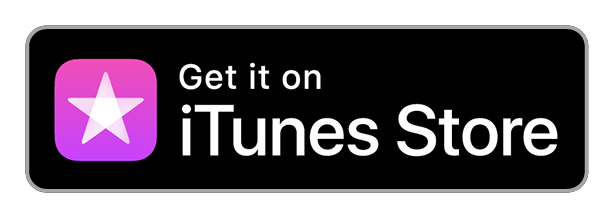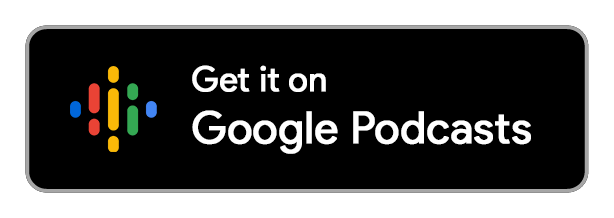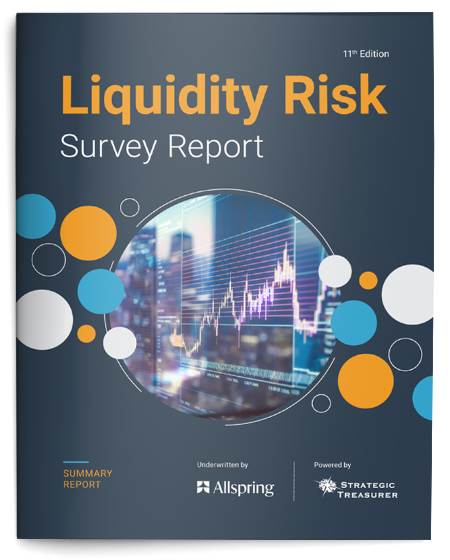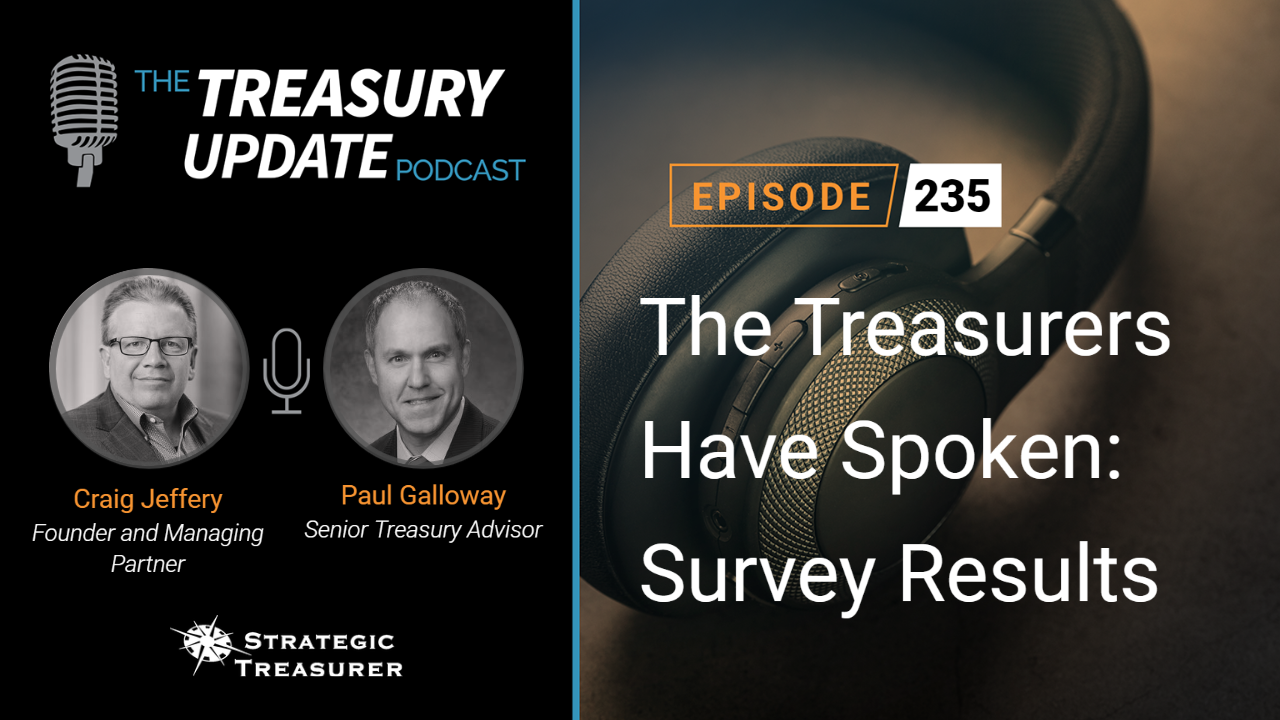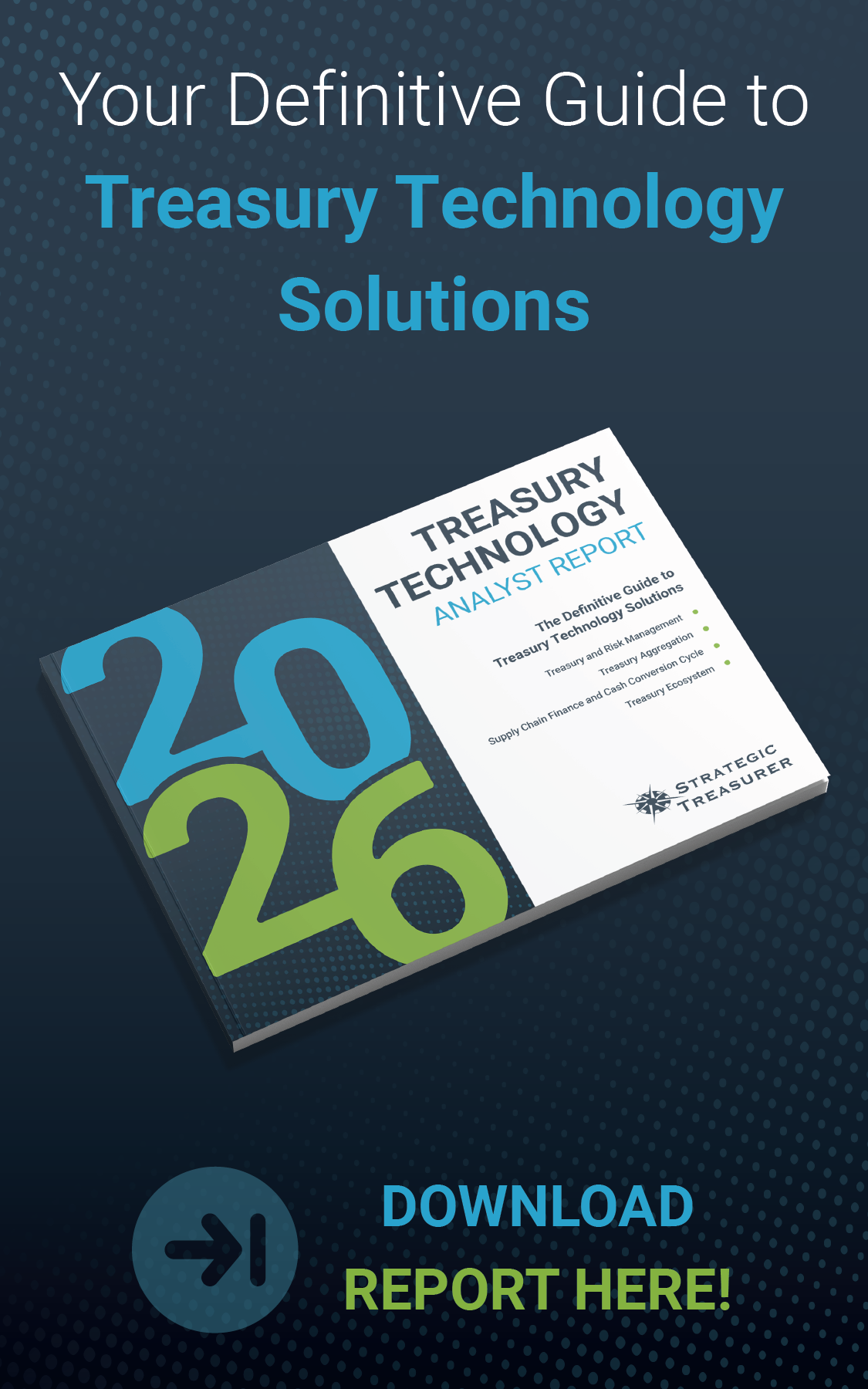
Episode 291
Remote Is Dead: Hybrid Work Is the New Norm – 2024 Outlook Series with Mike Richards
In today’s episode of the 2024 Outlook Series, host Craig Jeffery is joined by Mike Richards to review and predict changes in the treasury recruiting space. Topics of discussion include job shifts post-COVID, recruiting with job boards, and the creation of your own AI bots.
The 2024 Outlook Series features interviews with treasury experts about their expectations, projections, and insights for the year ahead. Find more 2024 Outlook Series episodes here.
Host:
Craig Jeffery,
Strategic Treasurer


Speaker:
Mike Richards,
The Treasury Recruitment Co

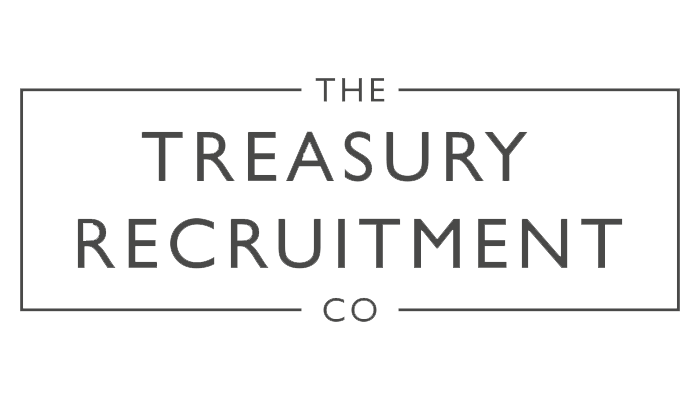
Episode Transcription - Episode #291 - Remote Is Dead: Hybrid Work Is the New Norm - 2024 Outlook Series with Mike Richards
Announcer 00:04
Welcome to the Treasury Update Podcast presented by Strategic Treasurer, your source for interesting treasury news, analysis, and insights in your car, at the gym, or wherever you decide to tune in.
Craig Jeffery 00:20
Welcome to the Treasury Update Podcast. This is Craig Jeffery, your host today. I have a very special guest, Mike Richards from Treasury Recruitment. Mike, thanks so much for joining me on this episode of the Treasury Update Podcast.
Mike Richards 00:32
I love being on these podcasts with the Craig. It’s still very weird for me for you to be asking the questions. Usually when I do my podcast, as I’ve said before, I just love to asking questions, sitting back, relaxing. Now I’m under the spotlight. So be gentle.
Craig Jeffery 00:45
That’s a big no. When I get a big dog like you and yeah, I’m gonna go for fun. Well, this is part of the 2024 Outlook Series. And since you focus so much on treasury careers and staffing, I’ll point people to the shownotes. Treasury Recruitment’s based in the UK, but they’re also huge in North America, all of North America, very heavy in that space. I know you’ve come to a lot of events. So, so welcome. But let’s start for the outlook on work location. I know it’s not work from home, is it hybrid? Is it reaching equilibrium? What’s going on with work location? It’s certainly changed a lot from the beginnings of COVID to where we are today. What are you seeing? What are you talking about with the companies that you’re recruiting for?
Mike Richards 01:30
Well just like in a newspaper, let’s start with the headline, remote is dead. The go the, you can leave with that. I mean, that’s, that’s the way of things. When I was at AFP conference with yourself in sunny San Diego, I did a session with Joel and Leann. Great to be with them. And I was being asked about remote jobs. They said do you work recruitment remote roles? And but no, we don’t. Oh, why is that? I said, Well, firstly, employers need someone remote they can do on LinkedIn and do it themselves. So you don’t need a recruiter. I said also, it’s fading, going away, because treasury by its very nature is a very collaborative discipline. You want to work with your colleagues. Do you need to be in the office, so going back to it fully on site? No, we proved this throughout COVID. So now a balance. Treasury is about balance in risk balancing and everything else. But treasury by its very nature is about working together. It’s collaborating, it’s working internationally, it’s working within the US. If you’ve got, if you’re more focused on the US, you want to see your colleagues, you don’t have to be with them five days a week, you don’t have to travel all the time, you don’t even sometimes I’ve seen also good hybrid arrangements where someone might be in the office, say one week, a month. And then the other three weeks are remote, but they’re actually working together. We had Steve Rosenthal on the podcast and live session back in New York. And he talked about with Broadridge they have a very intentional way of working that when people come into the office. You’re not allowed to just sit in your office and just not collaborate. Plan your time planned intentionality. I think it was sorry for the phrase, oh, no, it’s a great one. Because when you’re going to go to the office, when he travels there from New Jersey down into Manhattan and actually has the meetings with people, he has meetings, and is not just over Zoom, and you do get more things, you don’t have to do all the time.
Craig Jeffery 01:38
Interesting. So, so remote’s dead. I think you said hybrid is is here to stay. What about work from the office?
Mike Richards 03:32
I think there has been this pushback about that. I know that some of the big banks for instance, we we 100% banks and corporates, but when I’m talking to a lot my clients summer, I was about to name summer camp because we get in trouble. But some of those who are saying, Well, you got to be back in the office. Why? What’s the reason behind it? Oh, because we got these big offices, we pay for them. Okay, that’s your choice, not the staffs choice. And in actual fact, it’s becoming a point of difference when some of the banks, financial institutions, and then also into the corporate space, if you’re saying you don’t have to be here five days a week. But then if you’re saying, Well, we’re happy, we’re happyish with four. Yeah, that’s still not the right message is it? It’s like, well, really, we’d like to hear five days. I think, again, when I’ve talked to some of my clients, there are some of them that are saying with their teams, some of their teams still want to come in four or five days a week because it works for them. They’re likehappy with it. That’s great. But they’re also happy, just as happy with the team member that comes in two days that week, does see them and things like that. So I think the fully on site, what’s the word, is broken. You don’t need that. I just think unless there’s a specific reason. And there might be times in a corporate treasury team where you do need to be fully on site for a week. Big project. You know, we’re all hands on deck. But then the following week actually, you don’t need to be a next week. You know you can work from home next week. We did it throughout COVID. We proved.
Craig Jeffery 05:02
Yeah. Now, you had mentioned LinkedIn on recruiting side. I know when we chatted last week, you talked about what kind of roles are recruiting there versus using recruiters. Any nuances that you’re seeing or any changes that are coming up on the peer recruiter versus the, I’ll call them the job boards?
Mike Richards 05:20
Well, let’s look at LinkedIn. It’s obviously the biggest job board per se. I was recently, I’ve recently been working on a campaign in Chicago, and it’s ongoing and everything. But I’m retained to recruit for a client. They’re really great role. But they’ve been using LinkedIn. And I was like, right, so how’s that gone for you? And they were, well, we’re talking to you, aren’t we? I was like, yeah, exactly. So, something’s gone wrong. And I was like, okay, and we talked about a number of the people that applied for the role. And the way that I phrased it is you’ve gotten, you can get a lot of good candidates from there. But you’re not getting the candidate that wants to work for you. They’re leaving an unhappy home, ie whether in their current role there, there’s a reason that’s pushing them out, not necessarily attracting them to come and join you. That’s what LinkedIn gives you. It’s a massive pool of potential talent. But is that necessarily right for yourself? Not necessarily a good, you’re talking to people that are wanting an exit path from from a company, not necessarily wanting to come and make a next career step with you.
Craig Jeffery 06:22
You don’t want you don’t necessarily want someone running from, but more someone running to, I like I like the way you said that. You know, on the on the physical event side, you know, we went from COVID, where everything went virtual 2023 to me seemed like so many corporate practitioners, and tech firms and banks went to the physical event. They just really, really concentrated there is that what you’re seeing, and do you see that balancing out more as we go forward? I, I’ve got some thoughts on that too, across the board. But what are you suggesting here?
Mike Richards 06:54
Well, I definitely want to hear your thoughts about it in a moment. That’d be cool. but you asked me, so I’ll answerfirst, you said about how much I’m specifically focused on the US, as he very kindly put earlier now my colleague, another great Craig, he focuses more on the UK. Katie focusesmore on Europe. Let’s give you an example there. So between Katie and I, we’re going to be doing three maybe four events in Europe next year, or this year, Craig will be doing three stroke four in London and surrounds, I’m gonna be in the US 12 to 13, 12 to 14 times. And if that doesn’t prove that at live events, not just coming over with running to events in March at Times Square, where we’re going to be talking to some amazing treasures. Dana Laidhold from NASDAQ, we’ve got Chris Kokand, from Adeber, great treasures. And treasures want to be back in the room. We ran our Treasury Career Corner live in London a year and a half ago. And we had 100 people sign up 85 showed a year later when people started to know about it and see this event. We had 150 say yes. And it was a wet cold night in November, and horrible trains and everything else, 130 people showed up in the room. And it’s only growing. People want to be back and seeing their colleagues actually meeting, talking treasury, getting in discussion within the site with a peer group. What are you doing with yourTMS? What are you doing with rates? Also now treasury by its very nature is is showing its value once again with inflation and actually, people are going, yeah,cash isn’t free anymore. So we’re proving why we’re here, why we’re employed. I mean, what are your thoughts, Craig, you said about live events?
Craig Jeffery 08:38
Yeah, uh, you know, one of the things that we’ve seen because we do a lot of live events, and we do a lot of virtual events and virtual events and activities skyrocketed with with COVID. That was the only option. 2023 seemed to be, certainly from the fintech vendor side, more focused on almost I wouldn’t say exclusively focused, but some exclusively focused, on physical events. And we’ve seen this kind of this rebound just like the work location has gone from everyone was worked from the office and it was you know, all work from home and now it’s remote is dead, but it’s hybrid. Hybrid is the new environment. I think that’s happening on the the events too. There’s everyone wants to go to physical events, but you can only go to so many physical events. And there’s more engagement that happens. And so we’re we’ve seen a rebound, you know, back to sort of this equilibrium between physical events and virtual events because you can go to more virtual events. You may not have as much dialogue depending on the type of virtual event like a webinars, you know, one sided communication for the most part. Roundtables can work virtually during the time you’re talking. A roundtable in person or conference means you can have the sidebar conversation. So it just, I don’t know, it just seems like we’ve kind of we’ve driven over both sides of the, both edges to the road now where the new road is, you know, hybrid in both environments, physical and virtual.
Mike Richards 10:07
I think there’s that. I think also, we’ve come out of an age where you didn’t need to always go to events, you could prove you could go to a webinar to get some more of the technical subjects maybe. But actually, this is why we’re doing treasure curricular live. And this isn’t a sales pitch, this is much more, what I’ve noticed is that people want value. Right? If I’m going to come out of my home office, I’m going to make the effort is going to cost me to travel to your event, what are you going to give me in return? What value you’re going to give me as a treasury practitioner for spending an hour on the train? An hour there that your event, then some networking afterwards? Okay, what’s my, what’s my go to? What are you going to give me? And if you’re not providing that value, if it’s just Oh, come along and talk about AI? Or come along or talk about this? Well, hang on, I could do that. In virtually it’s more again, that’s why we’re doing where we’re talking to practitioners about their treasury careers. Because there’s nothing better than that in the room. And, and it’s not pat himself on the back, it’s quite the opposite. It’s more that I’ve discovered this, this wasn’t something I planned. It’s just from come out that podcast and everything else. And then I’ve been to a couple of other networking events which have been otherwise, again, I won’t say whom I they showed up expecting a full room. And I was like, Where is everyone? And they was like, yeah, it’s not really worked out. And I think that those listening today a much more selective with their time, then I have to go out there. I know that there are events, which you have to go to maybe for your CTP credits and things like that. That the people are then, I’ve got to go to that. It’s actually people. And if it’s an optional event, you’ve got to have a real pull factor.
Craig Jeffery 11:48
Yeah. Now as we continue the discussion, you know, of how these changes have taken place with physical events with where people work. What about shifting jobs, you know, before COVID and after, what are you, what do you seen are the biggest differences. Now in terms of how people are looking for positions or hunting for positions?
Mike Richards 12:09
It already started before COVID. But it wasn’t all the way there. We saw COVID actually brought along and the pandemic accelerated five years worth of flexible working, or compressed, if you like five to 10 years worth of work change, compresses it to two years. So everyone was like, wow, okay, their heads have just got used to it. What I mean by this, and the follow up point is, people don’t need your job. People don’t need to work. People don’t need to leave a lot of the time. Yes, they might need to leave, we talked earlier, if they’re unhappy, where they are not getting the right salary. But you need to come up with an irresistible proposition. You need to attract people to your, why should I come and join your company, and it’s more about people will vote with their feet, or I get clients and they say, well, people should want to come here. And I’m like, really? Tell me why. And it’s got to be that sort of irresistible proposition. It’s got to attract people that, I’ve taught, I’ve been working on this assignment recently for this client in Chicago be talking to candidates each and every day. And I talked to a great candidate on Friday, and he was attracted to the role. But I still have to talk to him about why it’s going to help his career succession planning, all the other things. It wasn’t like you just put an advert, oh, exciting, dynamic. We don’t do that. By the way, we don’t put it out there. Because it’s just platitudes and be like, I don’t care. I’m not gonna volunteer with. And he said, I’m going to have to update my resume because I wasn’t looking for all. I’m interested in my next career move. But people aren’t necessarily response rates are down. And this is where we prove our value. Again, I don’t want to make it a sales pitch is much more. This is what clients have to understand. They’ve said to me, or we put our adup on LinkedIn, I was like, Yeah, how’d that go for you? They’re like, and I can see a lot of time, responses: 2, and then this reposted 17 times. I’m like, Guys, come on. There’s, I think I gave you a practical example. There was a candidate back last year, but client actually, and he had been a candidate mine before. And he was recruiting, trying to recruit. And they are a global, global multinational, based in the US, one of the top companies to capture the sector. And he actually said, I don’t understand. We are great, we’rethis, in it taken him he was moving across internationally. He did all this stuff and was literally I said, is this just literally your job description more or less copy and pasted? And he was like, yeah, mostly. So but for the past 10 minutes, you’ve told me about your incredible career moves that you’ve told me about internationally, you’ve moved from the US. You’d be on the cross in Germany, then you’d be back then you went Latin America and now you’re back. You’ve got this great career. He said, Yes, it it tells me nothing about this and this job advert. I said this is just a list of responsibilities, right? And they went back to the drawing board. I said, look, once you’ve done this and encapsulated why you enjoy your job, to be honest, you’re not going to need me. And and sure enough, they weren’t. They actually, this is a real developmental role a real great stepping stone. I said, you’re going to attract enough candidates, and they did, both internally and externally. It is not enough now, if there are clients out there thinking, Oh, we’re just copy and pasting a job description. Don’t. It’s a job advert. You have to advertise a role. You have to attract people. And you have to put yourself in the, in the candidates’, in their, sit in their seat. If you were in their position, would you want to apply for that job? What is it that’s magical? How’s it going to enhance their careers? It’s got to be that. Otherwise, you’re just not going to get anyone
Craig Jeffery 13:18
Right, especially in many cases, if they have to move. They’re going to be getting rid of a low mortgage and having to swap it for a higher mortgage.
Mike Richards 15:52
Yeah, yeah, exactly. Getting started on salaries is crazy. I mean, the US market in terms of salaries is rising rapidly. We’re doing our latest global salary survey. We’re just crunching the numbers now. And I’ve just seen these good rises. But are they above the cost of inflation? Are they above the cost of living? Sometimes they’re not. They’re just keeping pace. People are looking far more at that.
Craig Jeffery 16:15
Yeah. And in the shownotes, will will will drop a link to the Treasury Career Corner, which is Mike’s podcast where he interviews all kinds of people for various topics, mostly on treasury careers. Certainly subscribe and look at that. Mike, as we shift over to our last topic, it’s really discussing artificial intelligence. This is a, more people are talking about it. We just completed a some research on artificial intelligence and generative AI. As you’re as you’re doing recruiting, are you having more conversations about AI? What are they like? Is this a, are people looking for those that are aware of it, learning about it, have skills in it? How are your partners, looking at artificial intelligence in finance and treasury in particular?
Mike Richards 17:08
Yes, yes. All of the above. And that’s it, bye. Thanks.
Craig Jeffery 17:13
Thanks for joining.
Mike Richards 17:14
Joking aside, that’s it. It’s like some clients are looking for, if it’s a particularly systems focus role, of course, they’re going to be looking for system skills. And part of that, is this new, the new tools that are coming to bear, data tools, AI, analytics, and everything else? Am I getting people that saying they want someone that’s a data guru in treasury? No. Is it nice to have? Yes, definitely. Is it great if someone’s studied Python? Yeah, great. Is it, do they need Crow’s? Do they need all the different things with it? Yeah, those are great things to have. Do they have VBA? Do they, yes, if it’s a technical role. But am I getting people saying right, my deputy treasurer needs to be that unless they are going to be in charge a massive systems project, and that’s going to be their go to thing, no. Not necessarily. What I do get more and more requests for is and I see treasure as being much more systems savvy, much more data savvy, if you like their their translators, they will be able to as I had been for many years, they will be the middleman. So a CFO, again, when we talk on the podcast a lot of weeks. I’ve seen that. We’ve done it for five and a half years. And it was something that was happening again, pre COVID and things like that. I’ve seen more and more CFOs asking their treasurers to be their, their route man, if you like, or woman, their route person, their tracker, their guide. Say, look, can you go out a few years ago was blockchain. Can you look at blockchain? Is that right for us? Crypto, do we need to stop this? And now it’s moved AI? How do we do this? And I am seeing it coming more in AI cash forecasting tools. AI being used in different areas as it and it’s rapidly developing. And I think we spoke in our pre podcast, one of my clients. He’s actually they’ve got their own AI for their company. It’s completely ring fenced. There are no public sort of linkages, if you like, but they’re using in a way, there IT guys, have got it so that he was looking the other day as a treasurer about something quite technical. He’s in insurance and things. He literally just use us use this AI bot that probably would have taken him two or three days of reaching out to people phone calls. And he put in this request and data in understanding and blah, blah, blah. And it gave him lots of the answers. And then two or three of the people he should talk to internally and actually gave him some of the technical information he needed. So instead of having two or three days research, it was five minutes on that. He went to the right person. They gave him the right information. It was the speed of response that he was able to go to his boss, the CFO, and a day later go, Oh, here’s the paper by the way, he was like, hang on I was going to that was next week. He said, Yeah, I’ve got it. Do you have any comments? He was like, Well, yeah, wow, how did you do this? He said, I didn’t do that quick. He said, I had a bot helped us. That’s it.
Craig Jeffery 20:12
My army did it. My bot army did it.
Mike Richards 20:14
Yeah, my bot, my army of bots. But he was he was very other thing. That’s one of the things we talked about dangers of it, these are that. They’re very heavily ring fenced. And I was like talking to him, and we’re going to talk about it. I’m gonna see him soon as well. Because I’d love to know about it.
Craig Jeffery 20:32
That makes sense, you know, the idea of protecting data, you don’t push it out into the public versions of that where it learns off of your internal data, right? There’s all kinds of issues. But if you have it inside, and it’s learning on your corporate data, and it’s kept within your walls, that’s perfect. Because it has that power. And like your description. I don’t think you didn’t call them, maybe you said guides.
Mike Richards 20:56
Guides. Yeah, they’re guides, Like the route guides like sort of the trackers that, yeah. And it’s and that’s what I’ve seen. And it was, it was happening before AI. It was happening before data. It was 10, 15 years ago, I’ve been in treasury recruitment, 25 plus years, and the thing was, I had a number of CFOs. Again, we talked about this, where a CFO said, again, I was speaking for JP Morgan at a session they had before Christmas. And I was being asked is the is the role of a treasurer changing? And I said, Well, what do you mean by this? They said, well, our CFO is asking for different things. And I went, do you know what? It depends? Oh, great. Yeah, nice definitive answer. But no, it depended on I had one of my treasures there. It wasn’t luckily at the session, but one of my treasures recently, he’s just started look for new role. Why? Previous previous CFOs left, previous CFO saw his him as a treasury, as the visionary said, Look, can you check this technology? Can you do this for me? Can you can you really be my my filter to all of those things? And he’s like, Yeah, brilliant, no problem at all. New CFOs come in. They see the role. They said all my previous treasurer work for me. Yeah, yeah. They manage the cash and looked after all that right. Okay. That’s where I see your role. I’d really like you to do that. Is that okay? No problem at all. Mike, here’smy resume. It depends on what the CFO and what their and also can be the company in the stage of development of companies a lot more issues. But I think that that is the leader helps, what do they see the role of the treasurer be?
Craig Jeffery 20:56
Yeah, if the role is to look at risks, to understand, to be a partner from a business perspective, not not just securing credit capital and doing transactions, using and leveraging tools that help you do that, more effectively is useful. I keep going back to what you just shared about that example of the person using the tool, and it gave him guidance and information as well as people to follow up on and then he spoke to people who are the experts, as opposed to just saying, hey, what this system told me is the truth. Because a lot of especially the language, you know, you know, the generative language ones, they’ll make stuff up that doesn’t really exist. And you have to be careful. So you have to have someone who knows, this is right, this saved me a lot of time. And this part is fiction. Right? It didn’t really exist. That seems to be the skill with using this type of tool on on AI.
Mike Richards 23:25
As you said, we we use it ourselves. We use ChatGPT. But it’s quite funny in recruitment, I’ll tend to see oh, that article is completely from AI. And I was hearing a friend’s podcast he does about Mark Williams, Mr. LinkedIn, does about this and how LinkedIn is going to be looking for guidance on that making sure that people aren’t just producing content is all AI driven. And we don’t do that. What we do do though, is if I’m looking at rephrasing something, or wanting to summarizing and rather than me think for half an hour ago, hang on, chuck it in there. What are the, what, what are the good points I’m making in there? What are the, where do I need to tweak it? What should I think about? Where it helps me distill my thinking a lot quicker and easier. My web guy also, James, he’s done a, I’ve got my own bot, with my own face. Lucky, lucky thing. It’s horrendous. But the fact is, what it does, it knows my tone of voice, and it listens. So we might take for instance, a transcript to this. So this is these are the kinds of points might make and and that they’re some of the custom instructions on there which say Mike’svery direct, he’s straight to the point, he doesn’t fluff around for 10 minutes. He’s like, right? Do do this, don’t do that, because we’re all short of time. So yeah, that’s one of the key things I try to focus on. And that’s what we’ve taught my bot to do. But there are some times when it forgets my customers structure and itgoes, I was doing an article, yeah blah blah blah makes a straight shooter, blah, blah, blah. I’m like, oh my god, stop. I would never, and I said, and I literally just gave it a slap. I went, I would not, you forgot my custom instructions. Oh, apologies. Yes, I should have looked at those. And then as soon as itdid, itcame out with a paragraph of text much more, sounded much more like me, but I only used, I didn’t copy paste. I took it and then amended it. It helps you, it’s not the solution.
Craig Jeffery 25:15
Mike, thanks for thanks for all your comments on work location, physical events, job shifting in AI. Any final, any final thoughts?
Mike Richards 25:23
Send me a resume if you’re looking for a role. If you need to recruit and you just want some advice, call us. I’m looking forward to seeing you guys. Lots of the conferences right away from New York across toNashville in 2024, and talking more treasury. What could be better?
Craig Jeffery 25:39
Sounds great. Thanks so much, Mike.
Announcer 25:40
You’ve reached the end of another episode of the Treasury Update Podcast. Be sure to follow Strategic Treasurer on LinkedIn. Just search for Strategic Treasurer. This podcast is provided for informational purposes only and statements made by Strategic Treasurer LLC on this podcast are not intended as legal, business, consulting, or tax advice. For more information, visit and bookmark StrategicTreasurer.com.
Subscribe to the Treasury Update Podcast on your favorite app!
Related Resources
Liquidity Risk Survey Report
The 2023 Liquidity Risk survey, presented with Allspring, polled treasury and finance practitioners on how they are evaluating current liquidity risk mitigation processes. We asked questions on macroeconomic changes and new regulations as they impact treasury. As one of our oldest running surveys, we are able to provide valuable year-over-year data that shows major and minor shifts in corporate risk mitigation strategies and predict future trends.
Ep. 235 – The Treasurers Have Spoken: Survey Results
On this episode, Mike Richards joins Craig Jeffery in a discussion that is fueled by two recent surveys. The first survey was Treasury’s Return to Office Status Survey conducted by Strategic Treasurer, which was taken by 249 respondents in the corporate, financial, and government spaces. This survey was live for two weeks, and the full report was only shared with participants.


